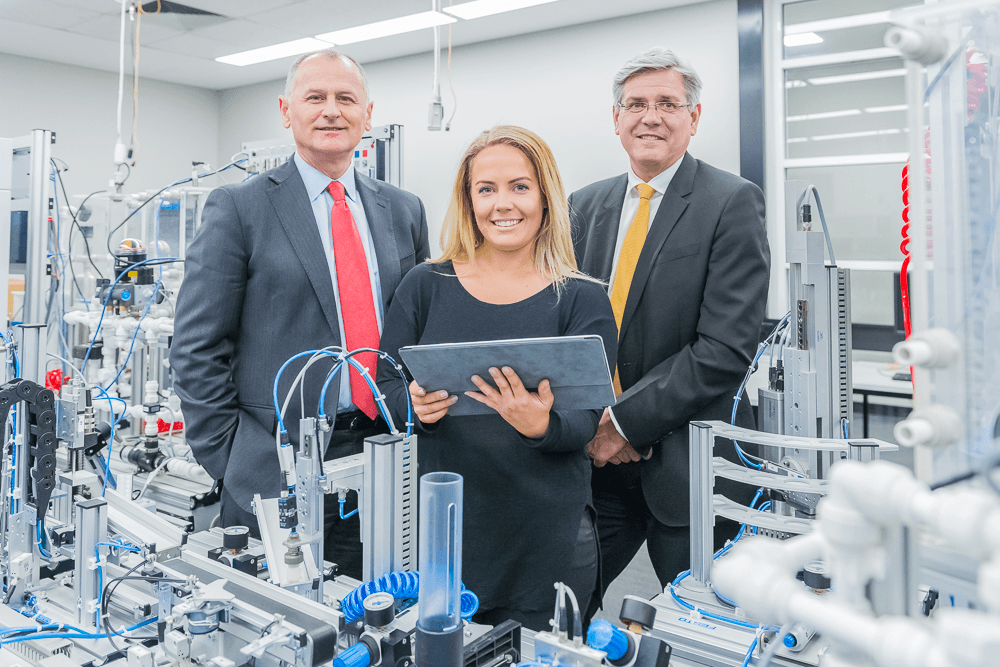No science or engineering background? No problem. A new apprenticeship scheme is addressing the skills shortage by training up people with no previous technical know-how.
What do beauty therapy and the internet of things have in common?
Absolutely nothing, unless you are 27-year-old solo mum Gabriella Swaby.
The Melbourne woman was managing a suburban beauty salon and realising she had to do something different with her life when she came across a new kind of apprenticeship.
“I needed a change, I’d pretty much reached the peak of my career,” she says. “I was considering an electrical apprenticeship, I needed to find something that would also pay me to study.”
Never in a million years did she think she would end up working for industrial manufacturing giant Siemens, studying cyberphysical systems, cloud computing, augmented reality, and yes, the internet of things.
She had grown up in a small Victorian town where people “didn’t do that higher intelligence kind of thing”. With nothing to lose, Gabriella applied for the Industry 4.0 apprenticeship programme launched by Siemens to encourage more people into the new digital trades. “When I went to one of those beginning interviews I was like, ‘how the hell, there’s no way’.
“I had no idea how electricity worked.”
Today she can’t wipe the smile off her face. She is currently on an apprentice’s wage, but her earning potential far outweighs the top salary of $50,000 she had reached as a beautician. And she is loving the learning. “It’s crazy to think I didn’t know these concepts before, because it’s my life now.”
Gabriella may be an extreme example, but the fact remains that employers desperately need to recruit more digitally savvy people. In case anyone’s missed it the world is now well into the Fourth Industrial Revolution, otherwise known as Industry 4.0 – the fusion of technologies that is blurring the lines between the physical, digital and biological. As business gear up to take on the new environment they are left facing a severe shortage of people with STEM (science, technology, engineering and maths) backgrounds.
Siemens, in conjunction with politicians, academics, unions and industry groups, is doing something about it. It has set up the first accredited Industry 4.0 apprenticeship scheme across the Tasman, and is in talks with Auckland University to roll it out here.
The need is great and the global corporate is not mucking around – the scheme involves giving learning institutions $2 billion worth of software licences so that they can train students in the appropriate technologies.
Paul Ravlich, Siemens’ New Zealand CEO and New South Wales regional manager, says there is a serious gap between what is coming out of the education system and what’s needed at work. Just 17% of school leavers are going on to STEM-related study while 70%-plus of the jobs on offer in industry require a STEM foundation.
“So the Industry 4.0 apprenticeship scheme was put in place to try and address that,” he says. “The objective was to have them learning in an environment, in an organisation like Siemens through business units, to gain firsthand knowledge.”
It also provides a pathway for the students to go on and study for an engineering degree if they want to, but that is not the main objective, Ravlich says.
The first crop of people currently going through the two-year programme set up in conjunction with Melbourne’s Swinburne University aren’t kids, he says – the oldest is 37. “It was quite a broad intake in the first tranche.”
While the Swinburne course is focused on manufacturing, Siemens is also setting up similar schemes in Western Australia and South Australia focusing on the mining and defence sectors respectively. Next cab off the rank will be Queensland with distributed energy systems, followed by New South Wales and pharmaceuticals, Ravlich says.
“We’re also now in discussions with Auckland to do similar in New Zealand, potentially with a focus on food and beverage, but we’ll see.” Siemens has also been talking to Finance Minister Grant Robertson, and New Zealand will be able to learn from the Australian experience, he says.
Auckland University is already conducting research into cyberphysical systems and has a small demonstration laboratory, so it’s a good fit, deputy vice chancellor Jim Metson says.
New Zealand is weak in technical students coming out of our polytech system, he says. “We risk being left behind because the need for skills is changing, both at university level, but especially in those highly technical sophisticated (skills).”
So is it a case of turning beauticians and people from all manner of different backgrounds into digital whizzes? “I think it is, because if you look at what underlies Industry 4.0 it is the digital revolution,” Metson says.
“We know in future of work discussions that we’re going to need a different type of skills base that will be very digitally literate, but then the range of pathways that that can develop are very broad.
“The modern nature of work is very fluid, and so putting kids on a pathway whereby we train them for X, Y, Z is kind of an historical model.”
The New Zealand system is different from Australia’s. Swinburne University is also a TAFE (technical and further education institute), but Auckland will need to do a deal with a polytech to set up an Industry 4.0 apprenticeship programme, Metson says. It has had some preliminary discussions.
It will also need a physical location for the programme. That is likely to be the university’s new Newmarket innovation campus, where there is a big push into 3D printing and other areas closely related to the new manufacturing technologies, he says.
Siemens’ contributions notwithstanding, the programme will require substantial resources and the impetus needs to come from the top down, Metson says. “It has to be driven and understood at all levels what the potential missed opportunity is.”
